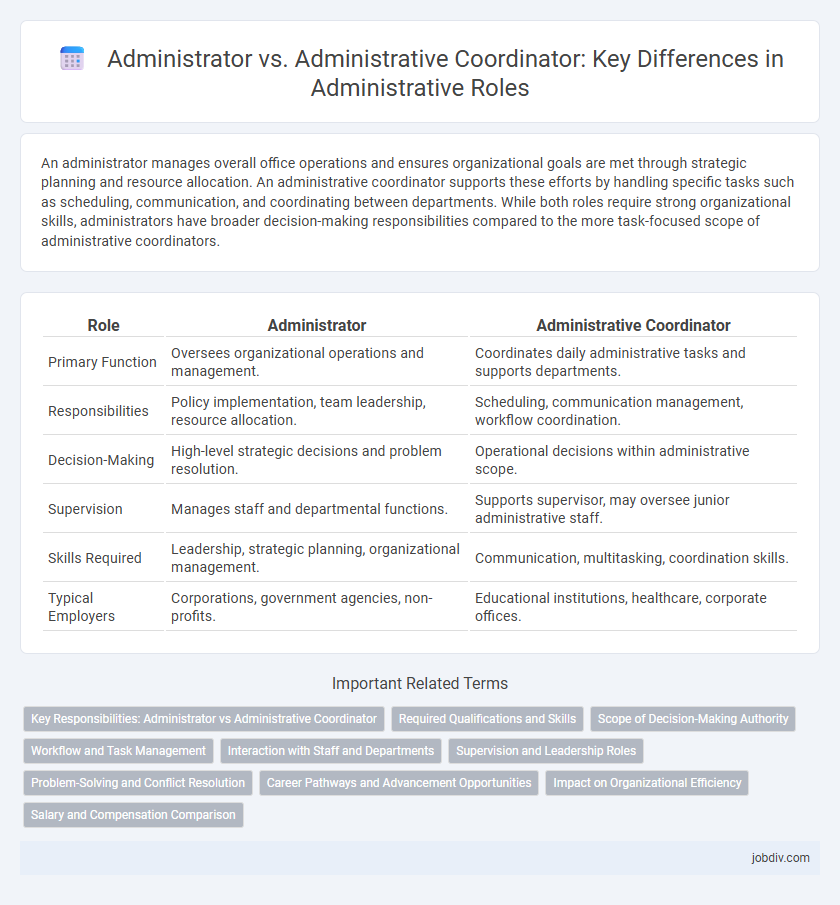An administrator manages overall office operations and ensures organizational goals are met through strategic planning and resource allocation. An administrative coordinator supports these efforts by handling specific tasks such as scheduling, communication, and coordinating between departments. While both roles require strong organizational skills, administrators have broader decision-making responsibilities compared to the more task-focused scope of administrative coordinators.
Table of Comparison
| Role | Administrator | Administrative Coordinator |
|---|---|---|
| Primary Function | Oversees organizational operations and management. | Coordinates daily administrative tasks and supports departments. |
| Responsibilities | Policy implementation, team leadership, resource allocation. | Scheduling, communication management, workflow coordination. |
| Decision-Making | High-level strategic decisions and problem resolution. | Operational decisions within administrative scope. |
| Supervision | Manages staff and departmental functions. | Supports supervisor, may oversee junior administrative staff. |
| Skills Required | Leadership, strategic planning, organizational management. | Communication, multitasking, coordination skills. |
| Typical Employers | Corporations, government agencies, non-profits. | Educational institutions, healthcare, corporate offices. |
Key Responsibilities: Administrator vs Administrative Coordinator
Administrators manage overall office operations, overseeing staffing, budgeting, and compliance with organizational policies to ensure efficient functioning. Administrative Coordinators focus on coordinating day-to-day administrative tasks, including scheduling, communication between departments, and support for project management. Both roles require strong organizational skills but differ in scope, with Administrators responsible for strategic management and Administrative Coordinators handling operational execution.
Required Qualifications and Skills
Administrators typically require a bachelor's degree in business administration, management, or a related field, along with strong leadership, organizational, and decision-making skills. Administrative Coordinators often need similar educational backgrounds but emphasize multitasking, communication, and coordination abilities to support multiple departments or projects effectively. Both roles benefit from proficiency in office software, time management, and problem-solving skills tailored to administrative environments.
Scope of Decision-Making Authority
Administrators typically hold broader decision-making authority, overseeing strategic planning, policy implementation, and resource allocation across departments. Administrative Coordinators usually operate within a narrower scope, managing daily operations, scheduling, and communication workflows under established guidelines. The distinction in decision-making authority reflects the scale of responsibility, with administrators influencing organizational direction while coordinators focus on operational support.
Workflow and Task Management
Administrators oversee overall workflow by setting priorities, delegating tasks, and ensuring smooth operations across departments. Administrative Coordinators focus on supporting these workflows through detailed scheduling, resource allocation, and tracking task completion to meet deadlines. Both roles require strong organizational skills, but the Administrator drives strategic workflow decisions while the Coordinator manages day-to-day task execution.
Interaction with Staff and Departments
An Administrator typically oversees overall office operations, facilitating communication between staff and departments to ensure organizational goals align with daily activities. An Administrative Coordinator focuses on coordinating specific administrative functions, acting as a liaison to streamline workflow and support departmental collaboration effectively. Both roles require strong interpersonal skills, but the Administrator manages broader interactions, while the Coordinator handles detailed coordination within and across teams.
Supervision and Leadership Roles
Administrators typically hold higher-level supervision and leadership responsibilities, overseeing entire departments or organizational units and making strategic decisions to ensure operational efficiency. Administrative Coordinators primarily manage day-to-day administrative tasks, supporting leadership by coordinating schedules, communications, and project workflows. The distinction lies in the scope of authority, where administrators lead teams and set priorities, while coordinators facilitate administrative processes under the direction of administrators.
Problem-Solving and Conflict Resolution
Administrators typically oversee organizational operations and implement strategic problem-solving techniques to address complex challenges, leveraging their authority to make decisive resolutions. Administrative Coordinators focus on facilitating communication and coordinating resources to resolve conflicts at the team level, ensuring smooth day-to-day functions. Their role emphasizes mediation and logistical support, while administrators prioritize broader policy enforcement and long-term conflict management strategies.
Career Pathways and Advancement Opportunities
An Administrator typically supervises organizational operations and manages high-level decision-making, positioning them for executive roles such as Office Manager or Director of Administration. Administrative Coordinators focus on supporting administrative functions and coordinating team activities, creating pathways toward specialized roles like Project Coordinator or Administrative Manager. Career advancement for Administrators often requires leadership experience and strategic skills, while Administrative Coordinators benefit from expertise in process optimization and cross-departmental communication.
Impact on Organizational Efficiency
Administrators oversee broad organizational functions, streamlining operations through strategic planning and resource management, which significantly boosts overall efficiency. Administrative Coordinators handle specific projects and coordinate communication among departments, ensuring timely completion of tasks and reducing workflow bottlenecks. Their complementary roles enhance operational coherence, directly impacting productivity and organizational performance.
Salary and Compensation Comparison
Administrators typically command higher salaries than Administrative Coordinators due to broader responsibilities, with average annual earnings around $75,000 compared to $50,000 for coordinators. Compensation for Administrators often includes performance bonuses and comprehensive benefits packages, reflecting their managerial roles. Administrative Coordinators usually receive standard benefits and hourly wages, emphasizing support tasks within organizational administration.
Administrator vs Administrative Coordinator Infographic

 jobdiv.com
jobdiv.com